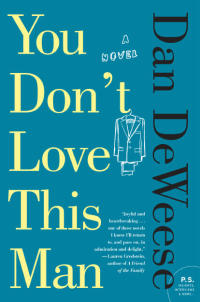
Published by Harper Perennial on March 1, 2011
At some point in You Don't Love This Man, Paul asks himself why he even tries to interact with other people. It's a good question because Paul isn't very good at it. Throughout the day that the novel chronicles, Paul antagonizes nearly everyone he meets (and the pattern continues in his memories of past encounters). The snapshot of his life makes for a worthwhile but not wholly pleasant reading experience. This is Paul having a bad day, but it left me wondering whether Paul has ever had a good day.
When the bank Paul manages is robbed on the day of his daughter's wedding, it brings back memories of an earlier robbery when he was a younger man, a teller whose encounter with the robber interrupted his fantasy about Gina, a former girlfriend who (with Grant, her new boyfriend) had visited the bank earlier that day. Paul had been dating Sandra at the time; now she's his ex-wife. Grant and Paul became friends; now Grant is about to marry Paul's daughter Miranda. Dealing with the aftermath of the current robbery occupies Paul's time as he wonders where Miranda has gone, why she hasn't appeared to begin the pre-wedding preparations. The narrative alternates between the past and present as the mystery of the missing bride unfolds and it soon becomes apparent that the two bank robberies are in some way connected. As Paul drifts through the day, he recalls seemingly random moments in his life: a confrontation with a boy Miranda invited to the house when she was fifteen; a conversation with Miranda after the boy kicks in the front door; a birthday dinner for Miranda that Grant unexpectedly joins; a barbecue for Sandra's tennis team in the final stages of their marriage.
A fair amount of this novel consists of Paul bickering with other people: most notably his ex-wife Sandra, his co-worker Catherine, Miranda and Grant. After awhile it becomes tiresome; the arguments all seem to run together. Anger is Paul's default emotion, although it's a low-key anger, fueled by angst that's driven by his inability to control everything and everyone around him, particularly his daughter (he's an archetype of the overprotective parent). He's sort of a self-aware jerk: he knows when he's being a jerk but can't seem to stop. He doesn't much like himself but he seems incapable of change. Although he doesn't try very hard to connect with people, it's obvious that he deeply regrets his inability to connect with his daughter -- and it's that regret that creates some hope for Paul's redemption.
If Dan DeWeese's purpose was to show a man in full as filtered through the prism of a single day, he created a man who seems crabbed, lacking any dimension beyond frustration and quiet rage. Maybe his purpose was to show a man in the late stages of disintegration. Difficult though it may be, there is value in reading about (and trying to understand) people we would rather not know. If nothing else, the novel might serve to heighten our awareness of unhealthy character traits that we might see in ourselves, or to guard against them.
I like DeWeese's writing style and I give him credit for bringing difficult personalities to life. His characters and their conflicts seemed very real: these are people who could (and probably do) live next door. The novel gains momentum as it moves along and the ending is strong. Some of the writing, particularly near the novel's end, is quite powerful. DeWeese creates moments that are illuminating and poignant. As much as I disliked Paul, I liked the book, and I look forward to reading more from DeWeese. I just hope his next novel features a main character whose life is more complete than Paul's.
RECOMMENDED